Despite board seat reversal, Elon Musk will still impact Twitter’s business success
Billionaire Elon Musk, Twitter's largest shareholder, has rejected a seat on the company's board just days after accepting it. By remaining on the outside, Musk will have more freedom to air his oft-controversial opinions on free speech and content moderation — which is sure to have direct implications for the platform's ability to generate ad revenue. Here, MediaRadar's co-founder and chief executive Todd Krizelman spells out these tensions.

/ Adobe Stock
Elon Musk is now Twitter’s largest shareholder, with a 9.2% share of the company. He’s a prolific and very high-profile Twitter user, with 80 million followers. Many of his Tweets — which vary widely across topics and frequently take a provocative stance — have become media events in themselves. Even though he has decided to reject an offer for a seat on the company's board, his actions and shared opinions will still prove highly influential. It won’t be surprising that Musk’s commentary regarding Twitter will be closely followed.
It’s not likely that Musk’s high opinions of the platform itself and its content regulations will disappear. In fact, he often uses the platform as a jumping-off point to start discussions about Twitter’s policies and features.
There has been a lot of talk surrounding how Twitter will or won’t moderate the content on its platform. Less of the discussion focuses on the implications for Twitter’s ad revenue. In reality, the two are tightly connected. Content decisions are business decisions for Twitter that will shape the company’s ability to grow its advertising revenue.
It's estimated that advertising is responsible for generating 89% of Twitter’s revenue. Elon Musk has famously said (on Twitter, no less) that he hates advertising. His company, Tesla, famously spends close to nothing on advertising in any media format. It is now very much in Musk’s best interest to keep Twitter’s revenue growing at a time when both user and revenue growth have slowed down, per the company's latest earnings report in February.
As long as Twitter relies on ad spend, its leadership must be prepared for the reality that what happens on the platform — what content users can share, how it is shared and who shares it — will influence how advertisers spend on the platform.
As YouTube and Facebook have each learned many times over, the quality of content directly impacts ad spend. Facebook and YouTube today publicize their efforts to remove content so they remain largely unregulated by the US government. But these efforts were originally a response to advertisers who often boycotted them.
Twitter has made a significant effort in recent years to clean up misinformation, hate speech, harassment and bot activity on its platform. This was done while struggling with admittedly challenging questions about whether and how to deplatform users for sharing harmful content.
Musk recently referred to himself as a “free speech absolutist.” This could put his own personal interests at odds with advertisers — and potentially with Twitter. Some believe he wants the freedom to be critical of the platform. As an outside investor rather than a board member, he will have more flexibility to do so.
It's also worth noting that Musk’s past comments about relaxing the platform’s content moderation policies have Twitter employees worrying about a resurgence in trolls. Brand marketers will certainly echo those concerns: They know the risks to their brands’ reputations and won’t willingly allow their brand content to appear adjacent to misinformation or incendiary language.
The tension between content moderation policies and ad spend is not new. Well before Facebook and YouTube learned they needed an advertiser-friendly environment, the earliest social media companies, including Friendster and MySpace, contended with the same issue. All came to essentially the same conclusion: to ignore advertiser concerns is to invite a decrease in ad sales.
Some have said that Twitter can rely on its new subscription model. But there’s no evidence that this is a bonafide business model. In the company's latest quarterly earnings report on February 10, Twitter’s chief executive Parag Agrawal, when asked about the number of paid subscribers, said, “It's a very small part of our revenue today. We're really excited about the future road map. It's not critical to how we deliver the $7.5 billion of revenue in 2023.” Twitter doesn’t release any metrics to public investors, but this hints that the revenue stream may be less than 5%.
It’s reasonable to expect once more that the premise of Twitter relaxing its content moderation policies — and allowing harmful and brand-unsafe content to spread unencumbered across its platform — will give marketers pause when they determine their budgets. Twitter, in making its own decisions about how to process Musk’s input, will need to acknowledge that its ability and willingness to provide the most brand-suitable environment possible is central to its survival.
Todd Krizelman is chief executive officer and co-founder at MediaRadar.

